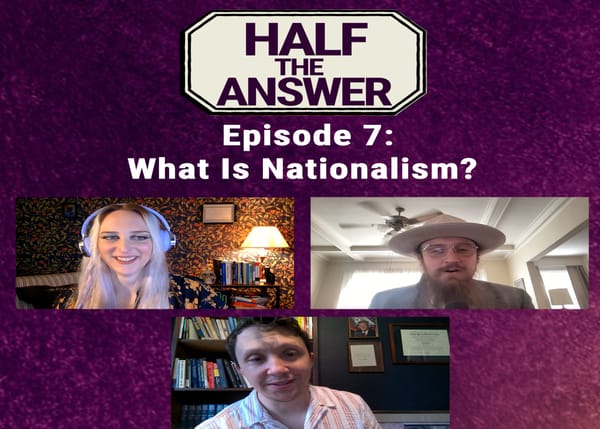Liberals Must Wage War on Rent-Seeking
Rent-seeking classes form a core backbone of the Republican Party.

Classical liberals once led the charge against rent-seeking: the practice of using political influence to secure economic benefits that would not otherwise be available in a competitive market. In the fight for free trade, protectionist tariffs were accurately portrayed as enriching the few at the expense of the many. State-granted monopolies, especially before the advent of general incorporation laws, were cast as unjust privileges incompatible with the philosophy of equal rights for all. The term “special interests” was coined in the context of these fights, disparaging them in contrast to the general interest, or common good, of all citizens.
Today, however, rent-seeking has receded from the forefront of political debate, leaving many of its most egregious forms to persist unchecked. Worse, much of the rent-seeking that exists today is hidden behind the rhetoric of free markets and economic liberty, even though it thrives on government intervention. This is especially true in the Republican Party, though not exclusively. In state and local politics, certain rent-seeking groups have become deeply entrenched, benefiting from regulatory capture and state-granted privileges. In turn, they become key backbones of the party coalition, forming much of the leadership and donor class. The over-representation of such professions among state legislators is one indication of the trend.
Reviving an aggressive focus on fighting rent-seeking is essential to returning liberalism to its roots and combating the distortions in the economy that harm consumers, stifle innovation, and concentrate wealth in the hands of the politically connected. The battle against rent-seeking is not a matter of calling for more regulation or rejecting free market economics. Rather, it is about recognizing that government has often become the tool of special interests, using its power not to protect competition but to suppress it in favor of artificial concentrations of wealth and power.
Car dealers and the ban on direct sales
One of the clearest examples of rent-seeking in modern America comes from the world of car dealerships. In every state, with a few narrow exceptions, laws prohibit car manufacturers from selling vehicles directly to consumers, requiring them to go through franchised dealerships instead. These laws are often framed as consumer protection measures, but in reality, they serve to protect the profits of car dealerships at the expense of both manufacturers and consumers.
The ban on direct manufacturer sales is a textbook example of rent-seeking. It prevents competition, forces consumers to pay higher prices, and limits their options. Electric vehicle companies like Tesla have battled these laws, in some cases managing to carve out exceptions, allowing them to sell their vehicles directly to buyers without going through the traditional dealership model. But entrenched dealership lobbies have fought back aggressively, using their political clout to maintain their monopoly position.
The irony is that this rent-seeking behavior persists under the banner of the Republican Party, which often champions free markets in its rhetoric. Yet at the state level, Republican lawmakers have repeatedly sided with car dealerships to preserve these anti-competitive laws. Gov. Ron DeSantis, for example, signed a bill expanding Florida’s ban on direct sales. Many of those lawmakers are franchise owners themselves, often owning a chain of several dealerships. They aren’t billionaires, but instead form a layer of the uppermost middle class, or if you prefer the lower upper class: the sort of people who live in “McMansions” and form a large part of the “local business community.” This is not a failure of laissez-faire policies but a case of government intervention used to grant monopoly privileges to a select group. It is the sort of privilege which is dispersed enough that it doesn't attract as much attention as the ultra-wealthy, but it is more than concentrated enough to make it an effective special interest, distorting both the economy and the political system.
Incumbent homeowners and NIMBY zoning laws
Another key example of rent-seeking comes from incumbent homeowners who, through restrictive zoning laws, have created artificial housing shortages in many parts of the country. These so-called NIMBY (Not In My Back Yard) regulations limit new housing construction, driving up property values for existing homeowners while making it increasingly difficult for others to afford a place to live. And the effect hits not only would-be homeowners locked out of the market, but also renters who find themselves paying ever-higher prices to landlords. Across the country, these regulations have contributed to skyrocketing housing costs, pricing out young families and working-class individuals. They also contribute to well-justified generational resentment, a kind of wealth transfer from the young to the old. Even though incomes today are higher than in the past, as are standards of living in general, a home is more visceral than a bank account. For many Americans, it is hard to square that our working-class grandparents without college educations managed to afford what would today be million-dollar homes.
Zoning laws that prevent the development of new housing are a form of rent-seeking because they create economic benefits for one group—incumbent homeowners—at the expense of others. By restricting supply, these regulations inflate property values, benefiting those who already own homes while leaving renters and prospective buyers in the cold. The result is a distorted housing market in which prices are artificially high, and opportunities for upward mobility are stifled. It is also no accident that many of these policies lock in the legacy of residential segregation even after decades of the law prohibiting explicit racial discrimination.
Much of this rent-seeking occurs under the guise of protecting neighborhoods, preserving character, or preventing urban sprawl. But the real effect is to block competition and innovation in the housing market. While some Republicans advocate for deregulation in other markets, they are often complicit in maintaining a regulatory framework that benefits a small class of property owners at the expense of everyone else. And to be sure, Democrats are not immune from the same phenomenon, with state and local parties at best divided between NIMBYs and their YIMBY opponents (the divide has been particularly stark in Democrat-dominated California, which suffers some of the most acute housing shortages in the country). And some Republicans, such as a recent successful effort in Montana, have seen their way to fight back against what they accurately termed “California-style zoning.” But on the whole, homeowners skew decidedly more Republican than the general population, leading to spurious rhetoric about a supposed war on single-family homes. Meanwhile, Kamala Harris used her convention acceptance speech to give a nod to “end[ing] America’s housing shortage,” a framing which accurately diagnoses the problem as a lack of supply.
Occupational licensing and barriers to entry
Another example of rent-seeking comes from the excessive occupational licensing laws that protect a wide variety of upper-middle-class professions from competition. In fields ranging from cosmetology to real estate to childcare, barriers to entry have been erected that require would-be entrants to jump through needless hoops—often involving costly and time-consuming licensing requirements. These regulations are framed as necessary for public safety, but in many cases, they are little more than protectionist measures designed to limit competition and secure higher wages for those already in the profession.
The explosion of occupational licensing laws is a relatively recent phenomenon, and it has had a chilling effect on economic mobility. Whereas once only a small number of professions—like law and medicine—required licenses, today nearly one in four Americans works in a job that requires some form of government approval. These barriers disproportionately affect those from lower-income backgrounds, who may not have the resources to navigate the licensing process, and they often prevent skilled individuals from entering a field even when there is no legitimate public safety concern. Many laws restrict these licenses to college graduates, or to those who complete hundreds of hours or more in professional training offered by a small number of schools.
Occupational licensing laws are another form of rent-seeking that thrives under both Republican and Democratic administrations, and to the credit of both parties, positive movement on this front has come from both sides of the aisle. Both opposition and support tends to break down along less partisan lines, in part because wide-ranging reform bills can affect a mix of groups that cut across parties in their respective skews. Still, excessively licensed occupations are particularly entrenched at the state level, where professional associations wield significant influence. These groups defend the licensing regime as a way to protect consumers, even when the evidence shows that these regulations do little more than protect incumbents from competition.
This is not a problem of too little regulation; it is a problem of too much regulation, used to grant special privileges to those with the political clout to secure them. By limiting competition, these laws stifle innovation, reduce job opportunities, and drive up costs for consumers. And they create another concentration of distorting wealth, feeding back into the political system which maintains them.
Labor mobility and the employer-based health insurance model
One of the most significant yet underappreciated forms of rent-seeking in America today is the employer-based health insurance system, which undermines labor mobility and distorts the job market. This model, entrenched during World War II as a way to circumvent wage controls, has since evolved into a major obstacle to economic freedom. It creates a situation where workers are often locked into their jobs because they fear losing access to affordable health care. The employer-based health insurance system serves as a prime example of how government policies, even when well-intentioned, can lead to market distortions that benefit some at the expense of others.
The employer-based model effectively ties health insurance to employment, making it difficult for workers to move between jobs, pursue entrepreneurial ventures, or even retire early. It does so by providing tax benefits for employer-based coverage but not on the individual marketplace. This creates a form of economic dependence where workers are less likely to seek better opportunities or challenge workplace conditions. As a result, labor mobility is severely restricted, and individuals are disincentivized from taking the kinds of economic risks that drive innovation and personal growth.
This distortion disproportionately benefits large corporations that can afford to offer comprehensive health plans, giving them a competitive advantage over smaller businesses or startups that struggle to provide similar benefits. Workers at these companies are less likely to leave for fear of losing their insurance, which in turn limits competition in the labor market, which has the effect of lowering wages. The employer-based health insurance system creates a form of rent-seeking by tethering benefits to large, established firms, effectively locking out smaller competitors and reducing overall labor market fluidity. It also concentrates immense wealth in the insurance providers themselves, a heavily restricted and regulated market with only a handful of large players.
From a liberal perspective, the solution to this problem is not more regulation or government control, but rather policies that increase choice and portability in health care. Allowing individuals to access health insurance independently of their employer would break the stranglehold that the current system has on labor mobility. It would empower workers to make decisions based on their career goals and personal aspirations rather than fear of losing health coverage. This shift would enhance economic freedom, increase competition in the labor market, and reduce the barriers to entrepreneurship, ultimately leading to a more dynamic and flexible economy.
In this way, the employer-based health insurance system is a hidden but potent form of rent-seeking that limits both individual freedom and economic innovation. Reforming this system should be a priority for any serious agenda aimed at reducing government-created barriers to economic mobility and competition. By decoupling health insurance from employment, we can restore workers' ability to move freely in the labor market, unleashing the kind of dynamism and creativity that drives prosperity.
Closed borders for thee but not for me
One of the starkest imbalances in today’s global economy is the mostly free movement of capital across borders, contrasted with the strict limitations on the movement of labor. Capital can flow freely between most countries with few restrictions, allowing businesses to seek out the most favorable environments for production, taxes, and labor costs. Labor, on the other hand, is often trapped within national borders, restricted by immigration laws and policies that make it difficult for workers to move to where opportunities are greatest.
This disparity creates a significant advantage for capital over labor. Businesses can relocate or invest abroad with ease, exploiting lower wages or more favorable regulations, while workers are unable to follow these opportunities. Instead, they are confined by national policies that prevent them from competing on a global scale. The result is a system where capital enjoys immense mobility and flexibility, while labor is artificially constrained, limiting both individual freedom and economic growth.
The restrictions on labor mobility also contribute to wage suppression, particularly for low- and middle-income workers. When workers cannot move freely to where they are most needed, labor markets become less efficient, with shortages in one region coexisting with unemployment in another. Meanwhile, capital takes full advantage of global opportunities, exacerbating income inequality and creating a world in which wealth flows freely across borders, but people do not.
For liberals, this imbalance should be a major concern. The solution, of course, is not to roll back the advances of free trade, but to extend international free trade on an equal footing to labor as well as capital. True economic freedom cannot exist when only one side of the equation can move without restriction. Allowing greater labor mobility would not only enhance individual freedom but also create more balanced and efficient global markets, benefiting workers and national economies alike.
Rent-seeking is not free market
The common thread running through all these examples is that they are not the result of under-regulation or laissez-faire economics. Rather, they are products of over-regulation and state-granted monopoly privileges. Rent-seeking flourishes when businesses and individuals use the power of the government to restrict competition and secure economic advantages that they could not earn in a truly free market.
This distortion of the market is precisely what liberals should be fighting against. Rent-seeking undermines the principles of economic freedom and voluntary exchange by allowing the politically connected to rig the system in their favor. It creates barriers to entry, inflates prices, and limits innovation. Worst of all, it perpetuates inequality by concentrating wealth and opportunity in the hands of those who can afford to buy political influence.
To revive the fight against rent-seeking, liberals need to refocus their efforts on the regulatory structures that are being exploited by special interests. This is not about calling for more government intervention, or the common progressive fixation that views “deregulation” as a dirty word. It is about returning to the idea that the role of government is to create a level playing field, not to pick winners and losers based on who has the most political clout.
One of the great underappreciated realities of American politics is that rent-seeking classes form a core backbone of the Republican Party, particularly at the state level. While Republicans often champion free markets in theory, in practice they have become beholden to powerful special interests that benefit from regulatory capture and government-granted privileges. Car dealerships, homeowners’ associations, and professional licensing boards are just a few of the groups that have embedded themselves in the Republican coalition, using their influence to maintain the very kinds of regulations that stifle competition and limit economic freedom.
This is not to say that Republicans are alone in this. Rent-seeking is a bipartisan problem, and many Democrats are equally guilty of supporting policies that benefit their own special interest groups. But it is particularly ironic in the case of Republicans, who so often claim to support free markets and limited government while simultaneously backing policies that do the exact opposite. The fight against rent-seeking is not a partisan issue—it is a matter of restoring economic freedom for everyone, not just the politically connected.
To revive the liberal tradition in the 21st century, we must once again make rent-seeking a central focus of our public policy debates. This means calling out the special interests that have captured state governments and demanding reforms that reduce their stranglehold on the economy. It means pushing back against the entrenched coalitions that have come to dominate the Republican Party at the state level. And it means standing up for the idea that true economic freedom requires not just the absence of government intervention, but the elimination of unjust government-granted privileges.
Featured image is Liberty Ford, by Nicholas Eckhart



